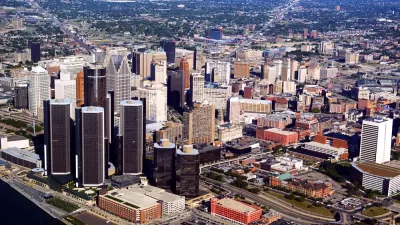Neighborhoods like Cherry in the fast-growing city of Charlotte are faced with intense pressures in the real estate market. The city is scrambling to craft a plan that can leverage the city's assets to the benefit of the whole city.
Sherrell Dorsey reports on the changes coming to the neighborhood of Charlotte as an example of larger trends and policy consequences at work in the city:
With its proximity to Uptown (the colloquial reference to the city’s downtown area) and good access to public transportation, post-2008 recession Cherry has been an easy target for developers, who are profiting from an abundance of vacant lots and low-cost homes.
According to Sherrell, the market trends replacing "1920s bungalows priced at $200,000" with "$600,000 California-style single-family homes" have been reflected in the city's demographics as well:
UNC Charlotte’s Urban Institute reported demographics last year that put Cherry’s population at 57.3 percent white and 37.4 percent black. Based on 1990 census data, the black population in Cherry about 25 years ago was 66 percent black. By 2000, that number had dropped to 55 percent.
The article focuses on the example of Cherry as an example of current residents having little recourse to stem the tide of gentrification. The city lacks any mechanisms for preserving or creating affordable housing units, such as inclusionary zoning, and the city is in the very early stages of creating an affordable housing plan.
FULL STORY: Charlotte’s Oldest Black Neighborhood Grapples With Gentrification

Maui's Vacation Rental Debate Turns Ugly
Verbal attacks, misinformation campaigns and fistfights plague a high-stakes debate to convert thousands of vacation rentals into long-term housing.

Planetizen Federal Action Tracker
A weekly monitor of how Trump’s orders and actions are impacting planners and planning in America.

San Francisco Suspends Traffic Calming Amidst Record Deaths
Citing “a challenging fiscal landscape,” the city will cease the program on the heels of 42 traffic deaths, including 24 pedestrians.

Defunct Pittsburgh Power Plant to Become Residential Tower
A decommissioned steam heat plant will be redeveloped into almost 100 affordable housing units.

Trump Prompts Restructuring of Transportation Research Board in “Unprecedented Overreach”
The TRB has eliminated more than half of its committees including those focused on climate, equity, and cities.

Amtrak Rolls Out New Orleans to Alabama “Mardi Gras” Train
The new service will operate morning and evening departures between Mobile and New Orleans.
Urban Design for Planners 1: Software Tools
This six-course series explores essential urban design concepts using open source software and equips planners with the tools they need to participate fully in the urban design process.
Planning for Universal Design
Learn the tools for implementing Universal Design in planning regulations.
Heyer Gruel & Associates PA
JM Goldson LLC
Custer County Colorado
City of Camden Redevelopment Agency
City of Astoria
Transportation Research & Education Center (TREC) at Portland State University
Jefferson Parish Government
Camden Redevelopment Agency
City of Claremont





























